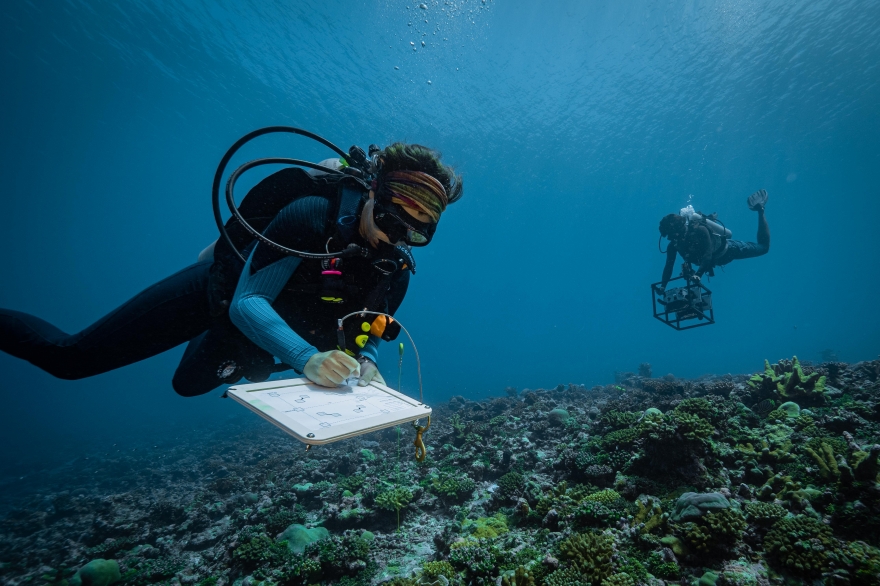
The Noo Raajje Program has released the assessment report from the 2020 Expedition, which surveyed the coral reefs and fish populations across almost all the Maldivian islands. The most encouraging finding showed that coral reefs may be recovering after the 2016 bleaching event, caused by a prolonged spike in ocean temperatures during the summer season.
The Noo Raajje scientists write that the apparent recovery in the amount of coral may be due in part to the high levels of recruitment recorded at the sites surveyed (an average of over 14 individual new corals, or ‘recruits’, per square meter), and was likely helped by high numbers of herbivore fish found.
The assessment is based on two expeditions of the northern and central atolls, carried out in January and February 2020 by scientists from the Waitt Institute, Scripps Institute of Oceanography, University of Western Australia, Maldives Marine Research Institute, and their partners from Small Island Research Group. The survey efforts were further supported by the Environmental Protection Agency, Oceano Azul Foundation, IUCN Maldives, Maldives Coral Institute, Centre de Recherches Insulaires et Observatoire de l’Environnement, Vava’u Environmental Protection Association, University of California Santa Barbara, NEKTON, and University of Hawai’i. The scientists surveyed 127 reef sites across 15 atolls.
Sites were classified as inhabited, resort, or uninhabited, and were surveyed across multiple indicators that can help scientists understand the overall health of a reef and its many important species. The indicators surveyed were;
- reef fish, reef shark, and large-bodied fish abundance, diversity, and biomass;
- species composition of bottom (benthic) communities;
- the abundance of juvenile corals;
- reef rugosity (shape and area of the reef that provides habitat and resilience);
- the abundance and diversity of benthic macroinvertebrates (clams, sea cucumbers, and others);
- and water quality.
The results of the assessment suggest that overall, Maldivian reefs have the capacity to recover following warming events, but local stressors may impact reef health at the local scale.
Although the results of the study are a cause for optimism, the scientists point out that prior to the 2016 bleaching, Maldives coral coverage was some 40%, suggesting that the recovery of the country’s coral reefs has a long way to go.
The fish survey data showed a high density of small-bodied plankton eating fish, , a moderate density of large herbivorous reef fish, like parrotfish, but only low densities of top predators and sharks. Large top predators like sharks and rays can indicate very high reef health, as well as bring in value to communities through tourism.
To read the assessment in full, click here: www.nooraajje.org/coral-reef-assessment
In March of 2021, the Noo Raajje Program completed a survey of the southern Maldives to finish the archipelago-wide assessment. A separate report will be complied based on that expedition’s results.
Noo Raajje is a program led by the Government of the Maldives, including the President's Office and the Ministry of Fisheries, Marine Resources and Agriculture, and in partnership with government agencies including the Ministry of Environment, Climate Change and Technology, the Ministry of National Planning, Housing and Infrastructure, the Ministry of Economic Development,the Ministry of Tourism, the Environment Protection Agency, Local Government Authority, the Maldives Marine Research Institute, and others.
International support comes from the Blue Prosperity Coalition, including the Waitt Institute, the Waitt Foundation, National Geographic Pristine Seas, Scripps Institution of Oceanography, SeaSketch, Environmental Markets Solutions Lab at UC Santa Barbara, UCLA Institute of the Environment and Sustainability, and others.
Learn more at www.nooraajje.org and follow along on the program's Facebook, Instagram, and Twitter.
Please login to Comment